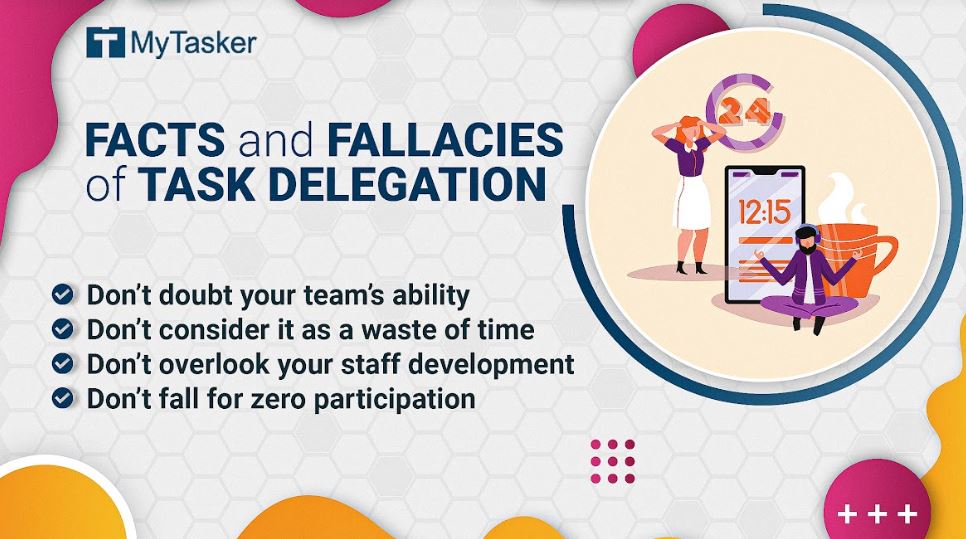You and I, every now and then, hear plenty of inspiring phrases like “teamwork makes the dream work” or “together we can achieve more.” While these quotes are uplifting, they often leave us wondering: How do we achieve that seamless collaboration? The secret lies in effective delegation.
Delegation isn’t just about giving tasks away to free up time. It’s about creating a structure that empowers the team, builds skills, and fosters trust. It’s one of the most impactful strategies for leadership and organizational success. Yet, it’s also one of the most misunderstood. When done poorly, it can lead to micromanagement, frustration, and a drop in morale. But, when done right, delegation not only lightens your load but makes your team stronger and more capable.
Let’s dive into the essential principles of delegation—understanding the “don’ts,” exploring the different types, and learning about the “rights” to ensure your leadership is transformative.
5 Don'ts of Task Delegation
-
Don’t Doubt Your Team’s Ability
It’s tempting to micromanage when we’re unsure of how things will turn out, but remember, delegation involves trust. Yes, mistakes will happen—but that’s where growth happens. Trusting your team to learn from those mistakes is a long-term investment in their development. -
Don’t Consider It a Waste of Time
When starting, you might feel it's faster to do the task yourself, but as your organization grows, effective delegation becomes a must. It frees up your time to focus on higher-value tasks and lets your team shine. -
Don’t Overlook Your Staff Development
Delegation is a tool for empowering your team. It allows team members to take ownership, feel a sense of accomplishment, and grow. The more you delegate, the more they learn—and the better they’ll perform long-term. -
Don’t Fall for Zero Participation
Delegation doesn’t mean disappearing. It means offering support, guidance, and oversight when necessary. Without your involvement and feedback, delegation can become disjointed, hurting your team’s morale and performance. -
Don’t Forget to Communicate
Effective delegation requires clear communication. Define expectations, deadlines, and outcomes—don’t just hand off tasks and hope for the best. Regular check-ins keep things on track and help prevent miscommunication.
5 Types of Task Delegation
-
Routine Task Delegation
Delegate those repetitive, non-strategic tasks that free up your time for bigger priorities. Examples include scheduling meetings or managing routine emails. These tasks are great for entry-level employees, providing them with experience without overwhelming them. -
Project-based Delegation
Assigning complex tasks or full projects with clear outcomes can help foster ownership. A senior team member might manage a marketing campaign or oversee a client pitch, allowing them to demonstrate their expertise while you remain focused on strategy. -
Decision-making Delegation
Delegating decision-making powers empowers team members and accelerates decision-making. For example, allowing a team member to approve minor budget adjustments frees you up to focus on larger, more strategic decisions. -
Developmental Delegation
Give your team tasks that challenge them and help them grow. Assigning a project to someone who is not yet in a leadership position but has the potential helps develop their skills for future roles. -
Delegation for Innovation
This kind of delegation is about freedom and creativity. When you give someone the responsibility to innovate—such as developing a new product design or service offering—you encourage outside-the-box thinking, which can drive new business opportunities.
Important Considerations for Effective Delegation
-
Clarity of Expectations
Don’t leave room for confusion. Be clear on deadlines, outcomes, and the level of quality expected. -
Trust and Autonomy
Your team needs the freedom to make decisions and find solutions without constantly seeking approval. Trust is the backbone of delegation. -
Regular Check-ins and Feedback
Delegation doesn’t mean “hands off.” It means oversight, support, and the opportunity to offer constructive feedback. -
Providing Support and Resources
Ensure your team has the necessary tools, training, and resources before you delegate. Set them up for success by making sure they have what they need to succeed. -
Avoiding Over-delegation
Don’t overwhelm your team with too much at once. Over-delegation can lead to burnout and underperformance.
The 5 Rights of Delegation
Delegation isn’t just about transferring tasks; it’s about transferring responsibility. The 5 Rights of Delegation help you delegate strategically, with confidence.
-
The Right Task
The task you delegate should align with the person’s role, skill set, and experience level. Delegate tasks that they can handle and grow from. -
The Right Circumstance
Ensure the environment is stable for delegation. Avoid assigning critical tasks during high-pressure moments. The right timing can make or break the success of the delegation. -
The Right Person
Not everyone is right for every task. Consider the strengths and experience of your team members before delegating, ensuring the person has the skills and resources to complete the task. -
The Right Communication
Don’t assume your team will know what to do. Clear, detailed communication about the task, expectations, and deadlines is vital to prevent misunderstandings and errors. -
The Right Supervision
Don’t micromanage, but don’t completely disappear either. Stay involved with regular check-ins and feedback to guide the process, ensuring success without taking control.
Why These 5 Rights Matter
The most common pitfalls of delegation stem from rushing or skipping steps. By following the 5 Rights, you’ll:
-
Ensure tasks are completed on time and correctly
-
Build trust and empowerment within your team
-
Free yourself up for high-priority work
-
Create a more efficient system for work across the team
Delegation isn’t just about getting rid of tasks—it’s about creating systems that foster growth, innovation, and efficiency. It’s an art that, when perfected, leads to stronger teams, improved productivity, and better organizational outcomes.
Mastering the art of delegation will elevate your leadership, transform your team, and drive your organization’s success. Ready to take the next step? Implement the 5 Don'ts, 5 Types, and 5 Rights for transformative delegation and see the positive impact on your team.
What is task delegation, and why is it important?
Task delegation is the deliberate act of assigning responsibilities and decision-making authority to others. It’s a cornerstone of leadership that enables managers to redistribute workloads, empower team members, and focus on the bigger picture. Effective delegation doesn't just lighten your load—it drives resource efficiency, boosts productivity, and nurtures a culture of trust, accountability, and collaboration, all of which contribute directly to the success of your organization.
How do I know which tasks to delegate?
Determining which tasks to delegate starts with evaluating their complexity, urgency, and the skills required. Routine tasks—those that are time-consuming but don’t demand specialized expertise—are prime candidates for delegation. These tasks free up your time for higher-level responsibilities. For more complex tasks, delegate based on team members’ strengths, experiences, and developmental goals. By aligning tasks with your team’s capabilities, you foster growth and maximize performance.
How can I avoid micromanaging when delegating tasks?
To sidestep micromanagement, lean on trust and transparent communication. Provide clear instructions, set specific expectations, and equip your team with the necessary resources. Let your team members take ownership and make decisions within their scope. While regular check-ins are important, resist the urge to hover. Trust your team to manage the tasks—they’ll grow, and you’ll gain more time to focus on strategic priorities.
How can I ensure that the tasks are completed successfully?
Success starts with clarity. Break tasks into manageable milestones with clear goals and deadlines. Regular check-ins will keep things on track, allowing you to offer constructive feedback and support where necessary. Encourage team ownership and keep an open line for assistance. A proactive approach—addressing any issues early on—ensures smoother execution and higher chances of success.
What if my team makes mistakes after delegation?
Mistakes are not failures—they are opportunities to learn. When your team stumbles, treat it as a chance for growth. Offer constructive feedback, walk them through the learning process, and help them develop from the experience. This encourages a growth mindset, where challenges become stepping stones to improvement and further responsibility.
How can I ensure I delegate tasks to the right team members effectively?
Effective delegation begins with a deep understanding of your team’s strengths, skills, and aspirations. Match tasks not only with their current skillset but also with their growth potential. Complex tasks should go to those with the necessary expertise, while simpler tasks can be assigned to those still developing their skills. Delegation is about empowerment—giving your team autonomy fosters trust and success.
What strategies help balance task complexity and team skills when delegating?
Balancing complexity and skills requires a strategic approach. Start by assessing the task and matching it to the individual’s level of expertise. For complex tasks, consider progressive delegation—divide the task into smaller components and gradually increase responsibility as your team member gains confidence. Leverage collaboration when tasks demand diverse skill sets. Communicate clearly how the task ties into the broader goals to boost focus and clarity.
How do I communicate clear expectations during delegation to avoid misunderstandings?
Clear communication is the bedrock of successful delegation. Define the desired outcomes, break tasks into milestones with deadlines, and be transparent about roles and boundaries. Ensure the team member understands their scope of decision-making authority. Confirm understanding and encourage questions—this proactive approach prevents misunderstandings and keeps tasks aligned.
In what ways can I use automation to streamline my task delegation process?
Automation can drastically enhance the efficiency of task delegation. Use project management tools like Trello, Asana, or Monday.com to automatically assign tasks based on team member expertise or task priority. Set up automated reminders for deadlines, progress updates, and check-ins. Cloud-based platforms like Google Drive can automatically share necessary documents. With automated reporting, you can track progress seamlessly, saving time on manual follow-ups.
When should I consider delegating recurring tasks versus one-time responsibilities?
Delegate recurring tasks—like managing emails or updating databases—because they can be streamlined over time, increasing efficiency. These tasks are perfect for skill-building and providing opportunities for team members to take on more responsibility. One-time tasks, especially those requiring specialized expertise or creative input, should be assigned based on the task’s complexity or unique nature. Regularly assess recurring tasks to ensure they continue to align with team development.
Is delegating tasks a weakness?
Absolutely not. Delegation is a leadership strength, not a weakness. It’s the hallmark of a confident leader who knows how to leverage their team’s strengths. Far from signaling a lack of capability, it demonstrates trust in your team’s abilities, and it creates opportunities for them to grow and develop into future leaders. Delegation not only helps avoid burnout but also fosters a collaborative culture that drives long-term success.
Ready to elevate your team’s performance and build a culture of trust and empowerment? Master the art of delegation today. Whether you're looking to refine your delegation skills or need a framework to implement in your organization, we're here to help. Contact us today to discover tailored strategies that will propel your team and organization toward greater efficiency and success!















